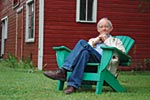Ted Kooser began his working career as a high school English teacher in 1962; he’s currently the Presidential Professor of English at the University of Nebraska-Lincoln, where he’s taught since 2000. He has won a Pulitzer Prize for poetry and was named U.S. Poet Laureate in 2004.
Between 1963 and 1999, Kooser wrote and published poetry—but he was also something else: Ted Kooser, insurance company executive.
Born in Ames, Iowa, in 1939, Kooser graduated from Iowa State University in 1962, and first worked in a high school. He then enrolled in a graduate writing program at the University of Nebraska. His biography at the Poetry Foundation says he “essentially flunked out a year later.” He had to eat, so he went to work for an insurance company in Lincoln in 1964 as an underwriter and worked in the insurance industry until 1999. He was a vice president of public relations for the Lincoln Benefit Life Company, now part of Allstate, at the end of his insurance career.
The comparison to Wallace Stevens is irresistible. Stevens worked for an insurance company for his entire career, even turning down an offer of a teaching position at an Ivy League University arranged by friends and admirers. Kooser has heard the comparison and has said the difference was that Stevens had more time to write poetry on the job (Stevens was a corporate attorney).
His first book of poetry, Official Entry Blank, was published in 1969 by the University of Nebraska Press (“essentially flunking out” seems not to have mattered to the publisher). Some 15 additional volumes followed, distributed by a wide array of publishers. In addition to a Pulitzer Prize and the U.S. Poet Laureate honor, Kooser has also received a Pushcart Prize, the Stanley Kunitz Prize, a Nebraska Book Award, and two fellowships from the National Endowment for the Arts, among many other recognitions.

Slap of the screen door, flat knock
of my grandmother’s boxy black shoes
on the wooden stoop, the hush and sweep
of her knob-kneed, cotton-aproned stride
out to the edge and then, toed in
with a furious twist and heave,
a bridge that leaps from her hot red hands
and hangs there shining for fifty years
over the mystified chickens,
over the swaying nettles, the ragweed,
the clay slope down to the creek,
over the redwing blackbirds in the tops
of the willows, a glorious rainbow
with an empty dishpan swinging at one end.
So many of his poems evoke similar images—aging family members, rural and farm life, home, the wonder of natural beauty, a blind woman joyfully caught in the rain, a birthday card sent by a sick aunt, the stars in a night sky, a porch swing—the simple things of everyday life, things too easy to overlook and too important not to.
Consider that most of Kooser’s poetry was published during his insurance career. He did not see the two lines of work—insurance and poetry—in opposition to each other. Like Wallace Stevens, the differences notwithstanding, most of his poetry writing occurred outside the academy, in a most unlikely place—an office at an insurance company.
Related:
Hear Kooser read A Letter in October.
Kooser’s Poetry in American Life Project for the Library of Congress, the Poetry Foundation, and the University of Nebraska-Lincoln.
Top photograph by Parker Knight. Sourced via Fickr. Photograph of Ted Kooser by UNL Publications and Photography. Poetry at Work™ post by Glynn Young, author of the novels Dancing Priest and the recently published A Light Shining
_____________________
Buy a year of happy work mornings today, just $2.99. In December we’re exploring the theme Haiku.
Now you can easily follow our new Poetry at Work posts. Add one of our Poetry at Work badges to your blog or website today!
- Longfellow’s “Paul Revere’s Ride”: Creating a National Legend - April 17, 2025
- Poets and Poems: Katie Kalisz and “Flu Season” - April 15, 2025
- Poets and Poems: Michelle Ortega and “When You Ask Me, Why Paris?” - April 10, 2025


Maureen Doallas says
I subscribe to Kooser’s ALP selections. He has done a wonderful job, I think, of spotlighting poets (most unfamiliar) who are worth reading. His is the epitome of accessible poetry. It cheers me to no end that he has received so many academy honors without having mired himself in all the to-do. I imagine meeting him would be a delight.
Do you know if he’s ever written about his work in insurance?
Glynn says
Maureen — i don’t know if he has any insurance poems – but I haven’t read all of his poetry.
Megan Willome says
I second Maureen’s recommendation of American Life in Poetry.
Thanks for this, Glynn. I’m such a huge fan of Kooser. I’d also like to mention his book about writing poetry, “The Poetry Home Repair Manual.”
Glynn says
Megan – thanks for the reference to his book.
Diana Trautwein says
How lovely to come here and learn all this – about a poet new to me. I’ll be reading more, that is for sure. Thanks, too for the wonderful haiku at your place today. They read like haiku to me, anyhow. But then, I don’t know much. :>)
Bethany Rohde says
Ted Kooser is my favorite poet. His poetry manuals and books have had a significant impact on me. His poem, “Mourners,” affected me so much that I bought four of his books.
I remember seeing something about him and The Mischief Cafe so I put him in your search bar and found this delightful piece. Thank you for writing and sharing it. I’m off to look for more Kooser.